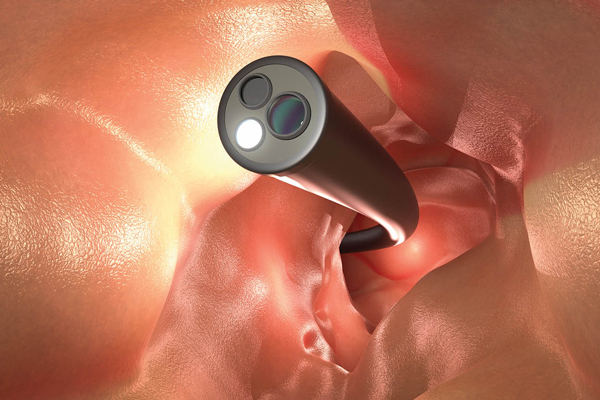CHARLOTTE, N.C.—For people found to have no adenomas or clinically significant serrated polyps, the quality of the index examination determines the risk for advanced disease outcomes 10 years later, according to follow-up from the New Hampshire Colonoscopy Registry.
“The guidelines for surveillance recommend a 10-year follow-up for individuals with a normal index exam, but this is predicated on having a high-quality exam …. In this study, the absolute risk for advanced outcomes at 10 years was lower after high-quality index exams, and the adjusted risk of the high-quality exam was also lower,” reported Joseph C. Anderson, MD, a professor of medicine at Dartmouth Geisel School of Medicine, in Hanover, N.H. (J Gastroenterol 2020;115[3]:415-434).
“While there was a statistically significant increase in the absolute risk after 10 years of follow-up for patients with low-quality index colonoscopy, there was no significant increase in risk for the patients with high-quality index colonoscopy,” he said. “These data support the importance of high-quality index exams in the prevention of interval colorectal cancer and support the 10-year interval for normal exams.”
Large Sample Size
Researchers used data from the New Hampshire Colonoscopy Registry (NHCR) to examine the effect of index colonoscopy exam quality on the risk for future outcomes in these patients. The NHCR, led by Lynn Butterly, MD, includes data from 2004 to the present on over 250,000 exams performed by more than 150 endoscopists in over 30 practices. Information on patient risk factors, detection of adenomas and serrated polyps, quality of examination and recommended surveillance interval is linked with state cancer registries.

The sample included 14,011 NHCR patients with low-risk findings, defined as no adenomas or no significant serrated polyps on index colonoscopy. Subjects had at least one follow-up colonoscopy 12 or more months after the index exam. Patients with inflammatory bowel disease and familial syndromes were excluded.
A high-quality examination was defined as a complete exam (reaching the cecum) with adequate bowel preparation, performed by an endoscopist with an adenoma detection rate (ADR) of 25% or higher. The primary outcome was detection on follow-up colonoscopy of advanced adenomas, large (=1 cm) serrated polyps or colorectal cancer. All analyses were adjusted for relevant variables.
“While our main goal was to examine the outcomes at 10 years or longer after index, we also examined outcomes at one to less than five years, and five years to less than 10 years,” Dr. Anderson said.
Results at 10-Plus Years
Presenting the results at the 2022 annual meeting of the American College of Gastroenterology (plenary 7), Dr. Anderson reported that of the 14,011 individuals in the sample, 2,283 had follow-up of 10 years or more. Of this group, 1,365 individuals were deemed to have had a low-quality index exam and 918 a high-quality exam.
The absolute risk for advanced disease outcomes was 4.0% among those with a high-quality exam versus 6.7% among those with a low-quality exam (hazard ratio [HR], 0.59; P=0.01). The adjusted risk of the high- versus low-quality exam also was significantly lower (HR, 0.53; P<0.01), Dr. Anderson reported.
The percentage of advanced disease outcomes among patients who underwent a low-quality index colonoscopy increased from approximately 5% by 10 years to almost 7% beyond 10 years (P<0.03). Among those who received a high-quality index exam, the percentage remained steady at approximately 4% over time.
For CRC, a high-quality index exam essentially halved the risk, which was 0.8% after a low-quality exam and 0.4% after a high-quality exam (HR, 0.53; P<0.01).
“Endoscopists should continue to focus on the quality of their exams by employing adequate withdrawal time to ensure optimal ADRs, and ensuring optimal bowel preps in their practices,” Dr. Anderson said.
Aiming for Excellence
Brooks D. Cash, MD, the Dan and Lillie Sterling Professor of Medicine and chief of the Division of Gastroenterology, Hepatology and Nutrition at the University of Texas Health Science Center, in Houston, said the study should be an impetus for all gastroenterologists to make “excellence” a goal.
“This [study] and other research from around the world highlight that endoscopists need to strive for high quality and to be measuring quality objectively,” Dr. Cash said. One aspect of this goal involves determining one’s ADR, a step that endoscopists may not take “because it’s difficult,” he added.
Noting that about one-third of the endoscopists in the study were not gastroenterologists, Dr. Cash emphasized that efforts to improve quality apply to all providers. “We need to hold all endoscopists to the same quality metrics that we hold gastroenterologists to. We all need adequate training, experience, self-analysis and adjudication of one’s performance.”
—Caroline Helwick
Drs. Anderson and Cash reported no relevant financial disclosures. Dr. Cash is a member of the Gastroenterology & Endoscopy News editorial board.
This article is from the January 2023 print issue.




